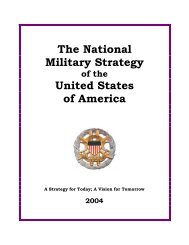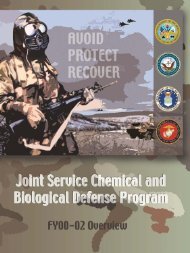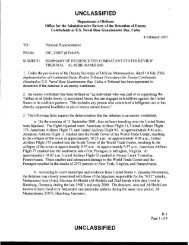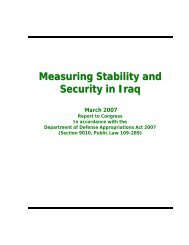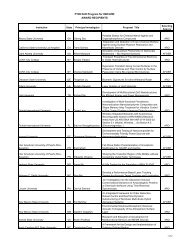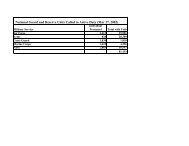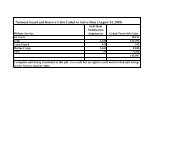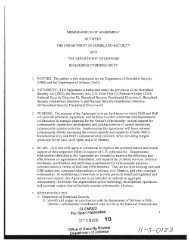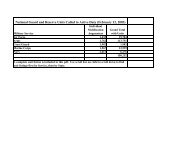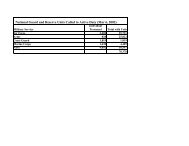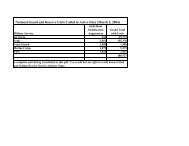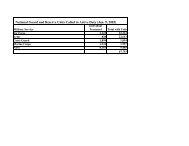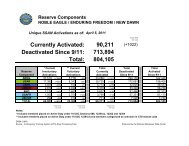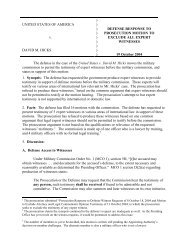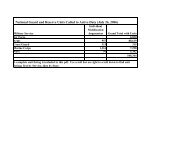Report on Progress Toward Security and Stability in - United States ...
Report on Progress Toward Security and Stability in - United States ...
Report on Progress Toward Security and Stability in - United States ...
You also want an ePaper? Increase the reach of your titles
YUMPU automatically turns print PDFs into web optimized ePapers that Google loves.
5.3: RULE OF LAW<br />
The <strong>United</strong> <strong>States</strong> <strong>and</strong> coaliti<strong>on</strong> partners c<strong>on</strong>duct a broad range of programs that promote the rule<br />
of law (RoL) <strong>in</strong> Afghanistan. The Department of Defense (DoD) rule of law efforts <strong>in</strong>clude:<br />
field support to civilian rule of law teams; tra<strong>in</strong><strong>in</strong>g judges, prosecutors, <strong>and</strong> correcti<strong>on</strong>s officials;<br />
provid<strong>in</strong>g necessary <strong>in</strong>frastructure for courts <strong>and</strong> pris<strong>on</strong>s; <strong>and</strong> tra<strong>in</strong><strong>in</strong>g MoI police forces <strong>in</strong> many<br />
aspects of law enforcement, from <strong>in</strong>vestigati<strong>on</strong>s to community polic<strong>in</strong>g. The U.S. Agency for<br />
Internati<strong>on</strong>al Development (USAID) provides broader governance <strong>and</strong> ec<strong>on</strong>omic development<br />
support, <strong>and</strong> the Department of State (DoS) provides fund<strong>in</strong>g for moderniz<strong>in</strong>g court<br />
adm<strong>in</strong>istrati<strong>on</strong> <strong>and</strong> develop<strong>in</strong>g transparency <strong>in</strong> the prosecutorial process. Other agencies like<br />
Justice, Treasury <strong>and</strong> Commerce provide subject matter experts to advise <strong>and</strong> tra<strong>in</strong> key members<br />
of Afghanistan’s rule of law effort.<br />
Overall, progress <strong>in</strong> rule of law c<strong>on</strong>t<strong>in</strong>ues to be mixed. The ma<strong>in</strong> challenges <strong>in</strong>clude a lack of<br />
access to the formal justice system, poor enforcement of the human rights protecti<strong>on</strong>s guaranteed<br />
by the Afghan c<strong>on</strong>stituti<strong>on</strong>, pervasive corrupti<strong>on</strong>, <strong>in</strong>sufficient transparency, <strong>and</strong> unsatisfactory<br />
protecti<strong>on</strong> of justice facilities <strong>and</strong> pers<strong>on</strong>nel. The shortage of human capital <strong>and</strong> lack of political<br />
will <strong>on</strong> the part of the Afghan Government to c<strong>on</strong>t<strong>in</strong>ue to susta<strong>in</strong> programs <strong>and</strong> facilities which<br />
have been put <strong>in</strong> place to ma<strong>in</strong>ta<strong>in</strong> security <strong>and</strong> stability as coaliti<strong>on</strong> forces draw down is also a<br />
key challenge go<strong>in</strong>g forward.<br />
RoL breakdowns may be both a cause <strong>and</strong> c<strong>on</strong>sequence of c<strong>on</strong>flict am<strong>on</strong>g Afghans. Taliban<br />
justice systems often fill – however brutally – community needs for swift adjudicati<strong>on</strong> to<br />
ma<strong>in</strong>ta<strong>in</strong> order. In do<strong>in</strong>g so, it establishes a shadow authority that not <strong>on</strong>ly challenges the<br />
legitimacy of the Afghan central government, but <strong>in</strong>vites warlord <strong>and</strong> crim<strong>in</strong>al competiti<strong>on</strong> for<br />
power <strong>and</strong> engenders further <strong>in</strong>stability. However, because of the c<strong>on</strong>t<strong>in</strong>ued weakness of the<br />
Afghan Government, Taliban justice rema<strong>in</strong>s a marketable commodity, as segments of the<br />
Afghan populace view Taliban systems as better than no resoluti<strong>on</strong> at all. To fulfill the<br />
requirements of security <strong>and</strong> susta<strong>in</strong>ability, security transiti<strong>on</strong> must <strong>in</strong>clude RoL, <strong>and</strong> transiti<strong>on</strong><br />
from military to civilian support must end with the full ownership of all aspects of the justice<br />
sector—police, courts, <strong>and</strong> pris<strong>on</strong>s—by local, prov<strong>in</strong>cial, <strong>and</strong> nati<strong>on</strong>al Afghan stakeholders.<br />
The rule of law missi<strong>on</strong> is shared am<strong>on</strong>g several military <strong>and</strong> civilian rule of law actors – U.S.<br />
military (specifically the Rule of Law Field Force – Afghanistan (ROLFF-A) <strong>and</strong> the Regi<strong>on</strong>al<br />
Comm<strong>and</strong>s), NTM-A, IJC, Regi<strong>on</strong>al Comm<strong>and</strong>ers, the U.S. Government, coaliti<strong>on</strong> civilians<br />
work<strong>in</strong>g <strong>in</strong> the Prov<strong>in</strong>cial Rec<strong>on</strong>structi<strong>on</strong> Teams (PRTs), UNAMA, a variety of NGOs, Afghan<br />
officials from relevant m<strong>in</strong>istries, <strong>and</strong> other justice officials. While NATO policy authorizes<br />
UNAMA to take the lead <strong>on</strong> all civilian governance <strong>and</strong> rule of law issues, their capacity is<br />
extremely limited, even <strong>in</strong> those regi<strong>on</strong>al comm<strong>and</strong>s led by coaliti<strong>on</strong> partners, such as RC-W<br />
(Italy) <strong>and</strong> RC-N (Germany). In RCs under the c<strong>on</strong>trol of the U.S. military, limited coord<strong>in</strong>ati<strong>on</strong><br />
with UNAMA occurs, <strong>and</strong> the lead <strong>on</strong> rule of law activities is jo<strong>in</strong>tly shared between the U.S.<br />
Government civilian agencies <strong>and</strong> the military actors referenced above.<br />
In an attempt to provide greater unity of effort across all communities, NATO Defense M<strong>in</strong>isters<br />
endorsed the establishment of the NATO Rule of Law Field Support Missi<strong>on</strong> – Afghanistan<br />
(NROLFSM-A) at the June 2011 Defense M<strong>in</strong>isterial. NROLFSM-A was <strong>in</strong>tended first to<br />
complement <strong>and</strong> eventually to assume resp<strong>on</strong>sibility for much of the liais<strong>on</strong> <strong>and</strong> coord<strong>in</strong>ati<strong>on</strong><br />
74



